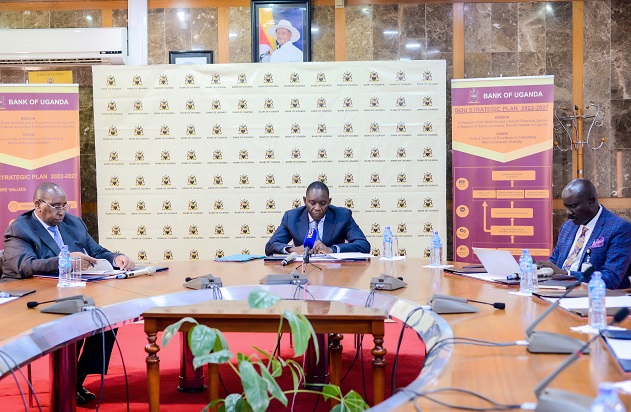BoU Deputy Governor, Michael Atingi-Ego (Centre)
The Bank of Uganda has further reduced its base interest rate (the Central Bank Rate) for the second consecutive monthly review to 9.75 percent for October, down from 10.0 percent in September 2024. This follows a decline in inflation from 3.5 percent at the end of August to 3.0 percent as of September 30, especially due to a fall in fuel and food prices, according to the Uganda Bureau of Statistics (UBOS).
This was mainly because of improved export earnings from coffee and gold exports, ease in effects of the global economic shocks like COVID-19 and the war in Ukraine, the monetary policy tightening, and relative stability of the shilling against the dollar.
BoU Deputy Governor, Michael Atingi-Ego said that considering these developments, they expect the inflation rate to remain below the target range of 5 percent, and can therefore comfortably ease the Monetary Policy to enable support to private sector credit growth.
Borrowing by the private sector has been a bit suppressed, only growing by 6.8 percent over the last financial year, compared to 5.0 percent. However, BOU says that while there is this growth in the increase, it is half of the targeted growth of 13 percent.
The Deputy Governor says that their activities as well as other changes that make the economy safer going forward, have decided to reduce the rate, though cautiously.
Some of the reasons for the low credit uptake are the high interest rates that average 21 percent while the prime lending rates remain at 17 percent, despite public and government outcry.
Speaking at the recent commissioning of Karuma Hydropower station, President Museveni accused the banks of stifling economic activity growth by keeping the interest rates high and called on them to cut the rates.
However, Dr Atingi-Ego says that there remain some risks that could trigger a renewed rise in the inflation rate, including possible effects of the escalation of the geo-political tensions in the Middle East and a rise in agricultural prices, and imported inflation, among others.
Dr. Adam Mugume, the Executive Director, Research says the impact of their policy review usually takes 12 to 18 months to show on the economy, and therefore, he adds, the aim is mainly to see lower interest rates and a boost in economic activity cannot be instant.
According to him, factors for this lag include the transactions that happen between the banks and the rate at which they deal with each other (Inter Bank), which is impacted by the Central Bank lending rates, hence finally feeding into the rates at which they lend to the public or to the government.
The Bank still maintains its economic growth projections for 2024/2025 at between 6 and 6.5 percent and to grow to 7 percent in 2025/2026.
-URN





